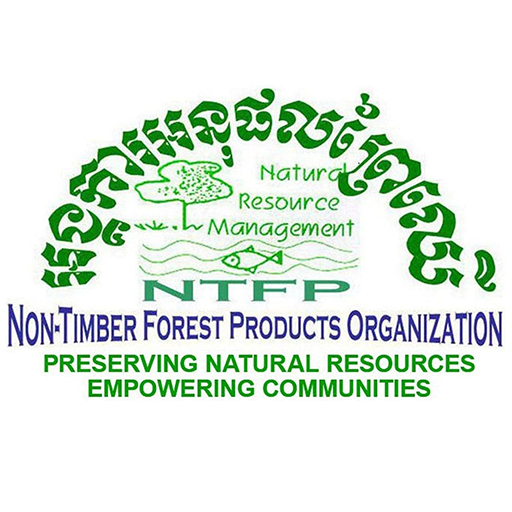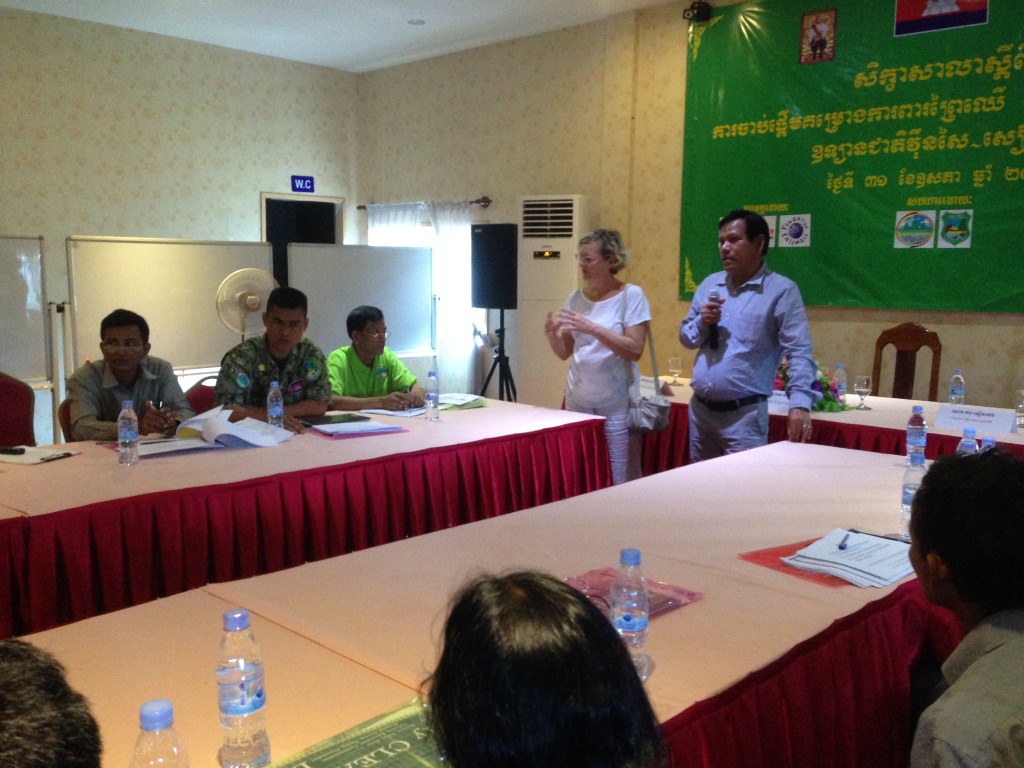About organization
Non-Timber Forest Products, NTFP, is a local Non-Government Organization based in Ratanakiri Province, NE Cambodia. Since we were established in 1996 we have played a critical role in helping indigenous people secure their rights to their land and natural resources. We also recognize the vital importance of preserving the cultural heritage of indigenous people, often inextricably linked with their lands and forests.
NTFP was registered with the Ministry of Interior of the Royal Government of Kingdom of Cambodia in March 2007.
NTFP was registered with the Ministry of Interior of the Royal Government of Kingdom of Cambodia in March 2007. NTFP is operating at 3 provinces, Ratanakiri, Preah Vihear and Stung Treng. Our main based office is in Ratanakiri province. NTFP has total 31 ( 9 females) staff in which 75% of them are indigenous staff. NTFP signed MoU with Ministry of Environment in Oct 2016.
NTFP received the Certificate of Compliance on Governance Professional & Practices (GPP), first time in 2009, and 2nd time in Dec 2017.
Our vision
Cambodians in Cambodia, particularly the indigenous people with both women and men, improved livelihoods in the friendly environment.
Our Mission
Providing the capacity development and supporting for the marginalized and vulnerable target people, especially the indigenous communities, including men, women, children, LGBT and disabled people in Cambodia to exercise human rights and indigenous people’s rights in improving their livelihoods.
Principals and Values
NTFP strives to operate as an example of good practice. We consider important to maintain the highest standards of integrity and fairness in our dealings with our stakeholders, partners and staff. To guide us, we have set out a clear set of Principles and Values which we endeavor to abide by. Our Principles guide us in our external work with the indigenous communities; Our Values guide us in our internal working as a responsible and professional organization.
CORE VALUE
1- Respect and promote the indigenous traditional and culture.
2- Women are the catalyst for social changes.
3- Actively team work;
4- Accountable and Transparency
PRINCIPLES
1- Working through traditional leadership structures while setting standards (quality and quantity) for female participation in all committees and activities.
2- Emphasizing a participatory approach, in which the communities are enabled to choose the direction of development that is appropriate for them.
3- Supports community members to speak for their rights, while creating the space for them to do so.
4- Support the use of local languages and encourage Indigenous staff.
5- Gender mainstreaming for all sectors in each stage of the project cycle.
6- Partnerships with the government agencies and civil societies.
7- No discrimination on race in staff selection and recruitment.
8. Every decision making is based on the democratic principle in promoting the
rights of expression by its staff and others.
Background and Experiences
NTFP has been working since 1996, the significant experiences of NTFP have been divided by phases and components, included :
- NRM Component:
* Community Forestry:
1996-1998:
– Assist communities to apply for rights to protect old forest and challenges with 1.2 million hectares of HERO land concession
1999-2002:
-Recognition by authorities, replication to other areas; Collaboration with CIDSE, and ICC.
2003-2005:
– Revision the rules to adapt the CF rules and regulation
* Land Security:
1996-1998:
– Supported study on Oil Palm Concession, resulted to have seminar to draft national policy on Highland People’s Development.
– Village mapping of traditional land use and management plan.
1999-2002:
– Expansion PLUP to other areas in Ochum and Taveng districts with ICC and CIDSE.
2003-2005:
– Changes of legislation, NTFP changed strategies to work on PLUP and worked close with provincial authorities, for instance community land use plan agreed, demarcation, mapping and GIS development.
2006:
– Review by-laws and increased collaboration with land department and MoI regarding communal land tenure.
*Participatory management of Protected Area
1996-1998:
– Expansion areas to buffer zone of Virak Chey National Park;
1999-2002:
– Improved cooperation with Ministry of Environment;
– NTFP facilitated joint policy discussion with park managers and communities.
2003-2005:
– MoE agreed to designate 5 CPA within the park;
– NTFP linked to Co-Management Learning Network and VNP as pilot site in Cambodia.
– NTFP made arrangement with CBNRM-LI
2006:
– Increased of networking with CMLN through various events and activities abroad.
- Networking and Advocacy Component
1996-1998:
– NTFP played a key role to form RNRMN, this was formed regarding logging issue over 100,000m² exported to Vietnam and thousands of tree cut) by military.
– Linked with NGO Forum Environment Working Group and involved in Forest Reform Discussion.
1999-2002:
– Collaborated with land and forest advocacy group;
– Established Sesan advocacy;
– Initiated High Lander Association;
2003-2005:
– Involved with National and Provincial working group to standardise the CF process;
– Assisted communities in Phaepimex land concession areas by bringing concern to national and provincial leve;
– Collaborated with others NGOs for legal recognition of IC and communal land registration
2006:
– Assisted communities to do complaints of mismanagement of national assembly annual logging concession in 4 NTFP target communes by collaboration with DPA, CFI, and LAC. Bring concerns to provincial level and FA.
– Conducted study national assembly annual logging concession with DPA, CFI and LAC.
- Micro-Enterprise Component
1996-1998:
– Initiated Yak Poey experiment to form farmer groups to cultivate lac insects.
– Supplied Ratanakiri handicrafts made by target communities to retailers in Phnom Penh.
1999-2002:
– Advocated and Campaign with Provincial governor to ban cut of malva nut tree;
2003-2005:
– Women of 5 villages network in Poy com sold traditional handicraft;
2006:
– Workshop to establish contact for women to sell traditional handicraft
- Non Formal Education Component
1996-1998:
– NFE classes at 12 target villages;
1999-2002:
– Piloted women numeracy and language skill in 6 villages;
– Cooperated with ICC to pilot Kawet language and started bilingual classes in Kawet language;
– Village associations to support NFE classes in all villages;
– Developed special curriculum for IP collaborated with ICC.
2003-2005:
– Developed and translated materials in IP language recognized by Ministry of Education and also used by NGOs in Rtk and MDK.
– Extended NFE classes to other communes and established mobile libraries at 18 target villages.
2006:
– Stopped NFE activities by NTFP but communities still run activities by themselves.
- Health Component
1996-1998:
– Vaccination campaign;
– Distributed mosquito net and education on nutrition and preventive health.
1999-2002:
Continues activities but changed villages
– Village Health groups in villages plan improvement of sanitation in villages.
2003-2005:
– Funding stopped
- Agriculture Component
1996-1998:
– Experimented home garden at Kok Lak;
– Fruit tree and variety trails in Tong Krapu village
1999-2002:
– Linked with CEDAC to improve agriculture activities;
2003-2005:
– SRI method to introduce to upland rice;
– Introduced use of cover crops into swidden systems; improved chicken raising; improved techniques for fruit tree planting; and introduced home garden.
2006:
– Workshop established process for independence for farmers in the future and established farmer association network at 6 villages to use agricultural technique.
- Indigenous Youth Development Component
1996-1998:
Not established yet
1999-2002:
– Established IYDP at town and elder advisory committee; 75 students trained.
– Joint research and documentation included ethno-musicology, village history, agriculture systems, and ceremonies.
2003-2005:
– Documentation on bilingual for HA, gained skills, employed with many NGOs, established IYDP at communities and assisted in research and other works with other NGOs like HA, ICC, CARE and CIDSE.
2006:
– IYDP with HA researched traditional conflict resolution and law, part of UNDP Access to Justice program.
– Leadership capacity building was conducted for youth and elders in each of the 7 commune committees;
2007-2009
1- Indigenous Youth Development;
2- Land registration ;
3- Co-Management Learning Network thru CPA.
4- Community Governance;
5- Indigenous People Well Being;
6- Non Formal Education;
7- Eco-Tourism;
8- Community Forestry.
2010-2012
1- Indigenous Youth Development;
2- Land registration ;
3- Co-Management Learning Network thru CPA.
4- Community Governance;
5- Indigenous People Well Being;
6- Non Formal Education
7- Climate Change Mitigation and Adatpation;
8- Community Forestry;
9- Mining and advocacy

